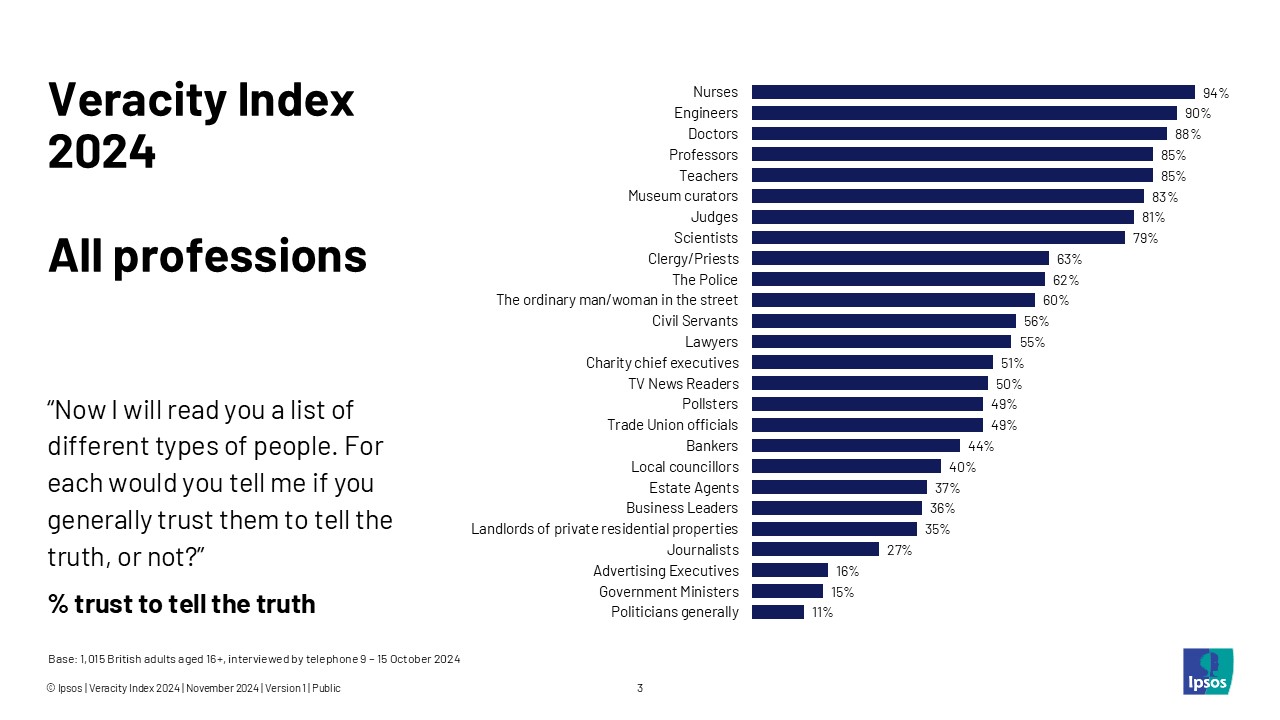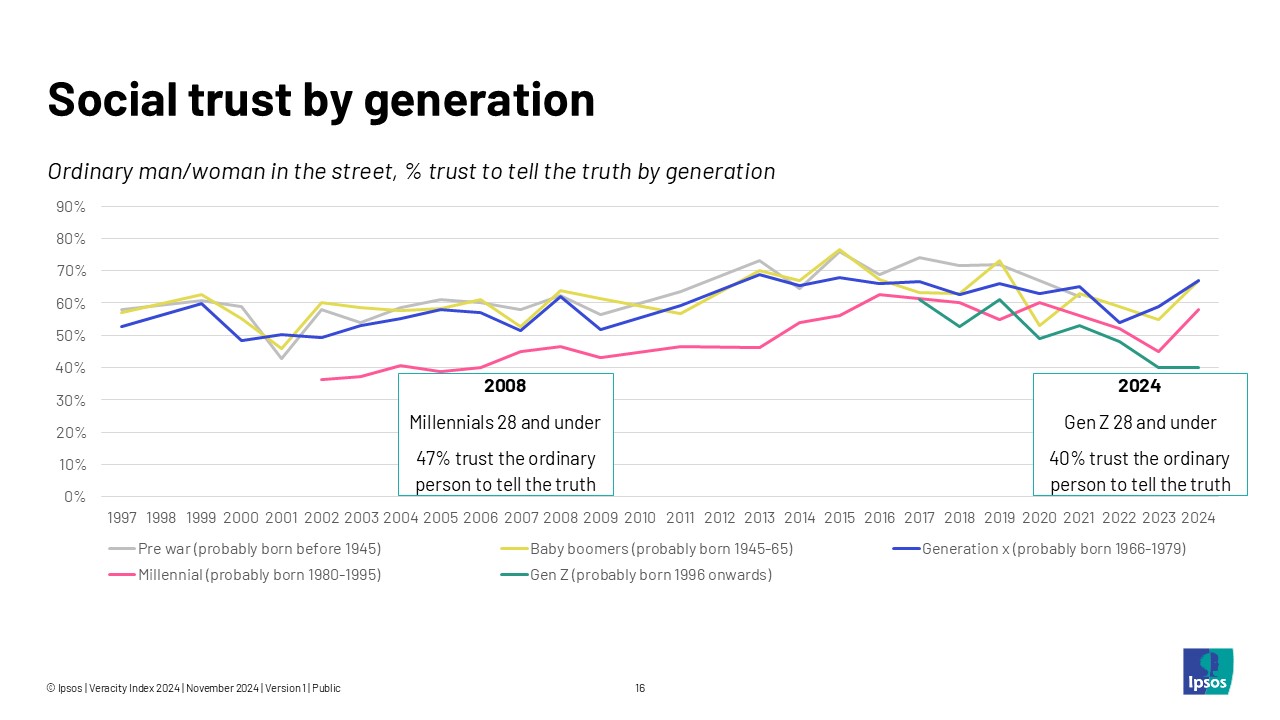Ipsos Veracity Index 2024
The 27th edition of the Ipsos Veracity Index records a broad improvement in public trust across a wide range of professions, partially erasing declines that had been recorded over the past few years.
Several professions have reached or equalled their highest levels of public trust this year: 49% of the British public say they trust Trade Union Officials to tell the truth, the highest level of trust since 1983 (matching their 2022 score of 48%) and a 31-point increase over that period. Trust in Business Leaders (36%) is also at its equal-highest level since 1983, matching the level recorded in 2017. Trust in Bankers has risen to 44%, the joint-highest score for this profession (equalling 2020) since it was first introduced to the Index in 2011. Similarly, the level of trust in Estate agents is at its highest level since they were first included in 2014 (37%, up 9 ppts this year).
Nurses continue as the country’s most trusted profession, with 94% of Britons saying they trust them to tell the truth, a six-point increase from last year. Engineers are second on 90% (+5ppt), with Doctors in third (88%, up three points). Professors and Teachers are joint fifth, on 85% apiece (an increase of nine and seven points since 2023 respectively).
Politicians remain Britain’s least trusted profession. Just eleven per cent trust them to tell the truth, scarcely higher than the 40-year low of nine per cent recorded last year. Government Ministers are second-bottom, on 15% - although this is a five-point improvement on their position last year.
Advertising executives are the third least-trusted profession with just 18% saying they trust them to tell the truth, and unlike most other professions they have not registered any increase in the proportion who trust them since 2023. The other professions in the bottom five are Journalists on 27% (despite a 6-point increase in trust since last year) and private residential landlords (35%, up just one point).

Four professions stand out as experiencing the greatest increase in public perceptions of truthfulness:
- Professors are trusted to tell the truth by 85% this year, up nine percentage points since 2023, back to levels last seen in 2019 before the Covid pandemic. Trust is higher still among those who hold a degree or doctorate (90%).
- After three decades of decline, Priests and the Clergy have registered their biggest uptick in trust since the turn of the century. Sixty-three per cent of the British public say they trust them to tell the truth, another nine-point jump since last year, again bringing them back to 2019 levels. Trust in Priests has increased most notably among the Baby Boomer generation (those aged 59-79) among whom trust has risen from 59% to 73%, as well as those living in Northern England (where trust has increased from 52% to 70%).
- Social trust has also risen in Britain; the proportion who say they trust the “ordinary man or woman in the street” increased by nine points, to 60% this year, back to where it was in 2021. While there have been notable increases among both home owners and social grades DE (+14ppt), age remains a significant divide: just four in ten of Generation Z (aged 28 and under) trust the ordinary person in the street, compared with almost six in ten Millennials and two thirds of Gen X and Baby Boomers.
- Estate agents are the fourth profession to have seen a nine-point increase in trust; they score 37% this year and have escaped the list of Britain’s five least trusted professions. This has been driven in part by a jump in trust among Millennials (up 14ppt to 40%).
The data also points to a widening gap in social trust between different generational cohorts. This year just four in ten members of Generation Z say they trust the ordinary person in the street, far below the scores for the older Millennial (58%), Gen X (67%) and Baby Boomer (67%) cohorts. While the older generations have shown increases in trust since 2023, the score for Gen Z remains the same as a year ago.
This score for Gen Z is lower than it was for Millennials when they were a comparable age. In 2008, when the Millennial generation comprised those aged 28 and under, 47% trusted the average person. This is seven points higher than Gen Z today although was similarly behind the scores for other generations – the gap between Millennials and Gen X in 2008 was 15 points compared with an 18-point gap between Gen Z and Millennials today.

Mike Clemence, a researcher at Ipsos, said:
This year we see a generalised increase in trust in professions, after a few years of sustained decreases for many of the occupations we investigate. The roles which have benefitted especially are professors, priests, the average person and – perhaps surprisingly – estate agents.
But this positivity has not extended to politicians, who remain Britain’s least trusted profession, nor to Advertising Executives who are the only role whose trust score has stayed level with 2023. Government Ministers have seen a small rise in trust but remain Britain’s second least trusted profession.
Technical note
- Ipsos interviewed a representative quota sample of 1,015 British adults aged 16+.
- Interviews were conducted by telephone between 9 and 15 October 2024.
- Prior to 2020 the index was carried out face-to-face; mode effects should be kept in mind when comparing the results with previous years’ data, especially when differences are close to the margin of error. Data is weighted to match the profile of the population.



